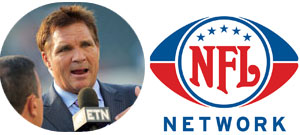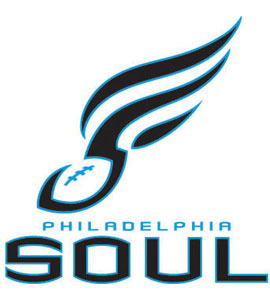BRAINS OVER BRAWN
Al Thompson
 Clockwise from top left: Eric Pihl is the in-house Counsel for ExamCorp and is pushing his dad and Dr. Peterson to get the new test completed and ready for use by teams.
****
Dr. Peterson one day hopes to have a test that will replace the famed Wonderlic test. Photo by Adam Jacobs.
****
Soul General Manager Phil Bogle says teams need smart offensive linemen in order to “Protect the Money.”
****
Soul tackle Neal Tivis was unaware offensive tackles were, on average, the smartest position in football. Photo by Al Thompson
Clockwise from top left: Eric Pihl is the in-house Counsel for ExamCorp and is pushing his dad and Dr. Peterson to get the new test completed and ready for use by teams.
****
Dr. Peterson one day hopes to have a test that will replace the famed Wonderlic test. Photo by Adam Jacobs.
****
Soul General Manager Phil Bogle says teams need smart offensive linemen in order to “Protect the Money.”
****
Soul tackle Neal Tivis was unaware offensive tackles were, on average, the smartest position in football. Photo by Al ThompsonIf you look at the NFL players who have recorded the top scores in the much hyped Wonderlic Test, an intelligence and problem-solving tool used by the NFL to help evaluate top prospects, you will likely walk away shrugging your shoulders and saying …” what’s the big deal? It really doesn’t work.”
With the amount of money teams pay players, scouting departments want to flip over every rock they can find to evaluate players.
Punter/kicker Pat McInally nailed the test, scoring a perfect 50 points. McInally was a fifth-round pick in the 1975 NFL Draft. He is the only player known to have gotten a perfect score. But he’s a punter. He had a nice career but Canton is not on the phone.
Linebacker Mike Mamula recorded a 49. He was first-round pick in the 1995 NFL Draft by the Eagles. He was solid but never reached the Pro Bowl level many thought he would.
Tight end Ben Watson scored a 48 and was drafted in the first-round in 2004 by the New England Patriots. Watson has drifted through the league since then, scoring 42 touchdowns with four different teams. His longevity is what distinguishes his career.
Quarterback Ryan Fitzpatrick also scored a 48, then was a seventh-round in 2005 NFL. The Harvard graduate is still the league having played for seven different teams.
All of these players have had at least decent careers but none will end up in the Hall of Fame.
So why does the NFL still use it?
When Eagles All Pro offensive tackle Lane Johnson was asked why his position always does so well in the Wonderlic, in fact offensive linemen, on average, finished with three of the four highest scores.
“I have no idea,” Johnson said. “I figure it might be the center because he’s the one making all the calls, all the problem-solving. I don’t really know. I think people put too much weight in that test. I don’t think it’s really good at evaluating a football player.”
The Wonderlic test consists of 50 multiple choice questions to be answered in 12 minutes. The test was developed by Eldon F. Wonderlic (of course).
The score is calculated as the number of correct answers given in the allotted time.
Just as puzzling are the elite players who scored poorly on the test.
Hall of Fame linebacker Ray Lewis got a 13, he was a first-round pick in the 1996 NFL Draft; Simeon Rice also recorded a 13, he was the third overall pick in the 1996 NFL Draft.
Also joining the “13″ club was Lamar Jackson, a first-round pick of the 2018 NFL Draft. Hall of Fame quarterback Jim Kelly, who led the Buffalo Bills to four consecutive Super Bowl appearances finished with a 15. Donovan McNabb, a member of the Eagles Hall of Fame managed just a score of 15 as well.
It is obvious the NFL still wants a test.
Currently there is a think tank that is trying to come up with a test that will give NFL teams a better read on finding the next Tom Brady or Shannon Sharpe.
The company is ExamCorp – with roots in Canada – is looking to develop an upgrade.
Dr. Jordan Peterson and Dr. Robert Pihl run the company with help from Dr. Pihl’s son Eric who acts as the In-House Council for ExamCorp.
“I’m the one driving the football IQ issue now,” Eric said recently. “I’m still in football circles, and I have a passion for discovering the answer.”
Peterson is a Canadian clinical psychologist and public intellectual, who is professor of psychology at the University of Toronto. His main areas of study are in abnormal, social, and personality psychology, with a particular interest in the psychology of religious and ideological belief, and the assessment and improvement of personality and performance.
He is also an author with several successful books on Amazon. Eric’s father is a professor of psychology at McGill University in Montreal.
There is a lot of brain power behind this project.
“We have to validate the test,” said Eric, who once was the Military Liaison for the White House Commission on Remembrance “Once we do that, then we can tailor it. If any team is interested in being tested, a good sample size of 50-100 would work great.”
Eric talked about how these tests are used in many fields. The common element to find people who have the smarts to be successful is “Executive Functioning.”
“Everyone is trying to predict how well a player will do,” said Pihl, who coaches high school football in California. “With all the testing they (NFL) do for the millions and millions of dollars they put in to see how a player is going to do, there is on one test, the Wonderlic, that tests their mental, their psychological the cognitive acumen”
Pihl says he, his dad and Peterson have been kicking this around since 2007. Part of the delay is, Pihl says, is universities are against spending resources on research for a new test.
Pihl was asked if they are ready now?
“We could but the thing is we have to figure out what’s important for each job position,” Pihl said. “That’s what’s unique about it. We’re measuring executive functioning, emotional intelligence and we’re combining that with personality. The personality is an easy test. Just take it. the executive functioning…you’re playing games on your computer. It’s going to measure your working memory, how well you learn, your attention-al control and your verbal fluency which is correlated with leadership. In each job they are trying to figure out what is important what percentage of leadership qualities need to match.”
ExamCorp may want to consult with past and present offensive linemen and football coaches.
Phil Bogle, the Assistant head coach and general manager of the Philadelphia Soul, who has a long career as an offensive lineman, playing for the San Diego Chargers (2003–2004), Cleveland Browns (2005), Tampa Bay Buccaneers (2005–2006, 08) and Philadelphia Soul (2007) has a lot to say on the subject.
He was asked if offensive linemen were the smartest players in the sport of football.
“Absolutely,” Bogle said without hesitation. “You have to be real cerebral down there because there’s a lot of moving pieces. There is the one group on the football field that you’re depending on four other guys and if you bring in the tight ends to the mix, there are five other guys. With that, you have to know where all those moving pieces are going to be. It come down to a lot of coordination.”
Bogle brought up the Denver Broncos championship offensive lines in 1997 and 98 that included starters Tony Jones, Gary Zimmerman, Brian Habib, Mark Schlereth, Tom Nalen, Dan Neil and Philadelphia native Harry Swayne.
This group prided themselves on their brains, not brawn. None of these guys weighed over 300 pounds.
“If you watch a film of those guys, they’re all taking the same step at the same time, going in the same direction, “Bogle said. “When it comes down to it, the team that doesn’t make mistakes within that group are the ones that are successful. That’s why you have to be (smart).”
Bogle brought up the most important role for the offensive line.
“At the end of the day, you’re protecting the money,” Bogle said, alluding to the quarterback. “You’re protecting the money. So you better have somebody smart out there, to protect that guy.”
Soul offensive tackle Neal Tivis seemed surprised that his position was statistically the brightest.
“Honestly I couldn’t really tell you why,” Tivis said with a laugh. “I’ve played with some guys that don’t fit that mold but some do. (Soul center) Wayne Tribue is a super smart guy, so is PK (OL Phillip-Keith Manley). But I never really thought about it like that. In the outdoor game you’re reading the secondary, the linebackers and the down lineman…everything. I guess since there’s so much going on you’ve got more to think about. You have to think quick.”

Head coach Clint Dolezel says he welcomes any new way he can evaluate talent as long as it’s better. Photo from philadelphiasoul.com
Soul head coach Clint Dolezel was on the same back as Bogle.
“The adage that linemen are dumb, it’s a myth” Dolezel said. “ Those guys are smart. You can’t play in the NFL and be a dummy.”
Dolezel talked about all how far the blocking schemes have advanced over the years.
“In the box, it’s not the days anymore when you said ‘you’ve got this guy’…’you’ve got that guy,’” the veteran Arena Football League coach said. “There’s a formula with the schemes with offensive coordinators. I thought centers would be No. 1, then tackles. The center has taken away the job of the quarterback as far as pointing out who is blitzing, whose not. He’s taking out half the side (of the field) that the quarterback has to worry about.”
Dolezel also singled out Tribue for his intellect.
“Wayne has what three degrees? Dolezel said. “That sucker is smart. But all our bigs are smart up front. Their (Wonderlic) scores don’t surprise me at all.”

Chance Warmack says the test is accurate because a lineman’s job is more problem solving than sheer strength. Photo by Andy Lewis / contrastphotography.com
Eagles guard Chance Warmack, a three-time national champion at Alabama, said he was not surprised how well offensive linemen do on intelligence testing.
“I don’t know about [the Wonderlic test], I can only speak from an offensive lineman’s perspective of solving problems,” Warmack said. “You’re preparing to execute a play day in and day out, depending on what the (defensive) front is or what defense you’re playing against, or you’re seeing something you’ve never seen before. When you’re comparing that to problem solving, I think that is a good comparison because you have to solve the problem on the fly, in the game, or in practice. We have to react to an audible and pay attention to what they’re doing as well”
Warmack did agree that his main objective on the field is to protect the money.
“Pretty much,” Warmack said. “You give up a sack everybody knows your name. But really you have to respect the position. You can’t just go in and know the play. You have to know multiple fronts, you have to know personnel…there are some many different factors. You’ve got to use your brain.”
Dolezel said football, as a sport should welcome new ways to evaluate talent.
“It doesn’t matter what you do if it’s better, it’s better,” Dolezel said. “It doesn’t matter if it’s teaching, being a fireman, whatever the job is, or whatever the formula is to make something better, you use it, you evolve. That’s why our sport’s better, you evolve.” *
Wonderlic stats from Wikipedia.
Follow Al Thompson on Twitter @thompsoniii












